|
When the World Heath Organization decided that 2020 would be the Year of the Nurse and Midwife, it turned out to be a prescient decision. It's also National Nursing Week in Canada. Nurses have been asked to step up to the incredible task of working through a pandemic around the world. In Canada, Black nurses
have long faced discrimination. Canadian nursing schools barred their entry until the 1940s. Black nurses, especially Black women, still face exclusion and discrimination even as they provide care to so many. Today in The Conversation Canada, Keisha Jefferies of Dalhousie University says the work of Black nurses in Canada should be recognized as a starting point to changing the entire field of nursing.
Also today:
Regards,
|

Black nurses meet a number of barriers in health-care practice.
(Hush Naidoo/Unsplash)
Keisha Jefferies, Dalhousie University
Anti-Blackness lingers in nursing and continues to limit access for Black folks, especially within nursing schools.
|
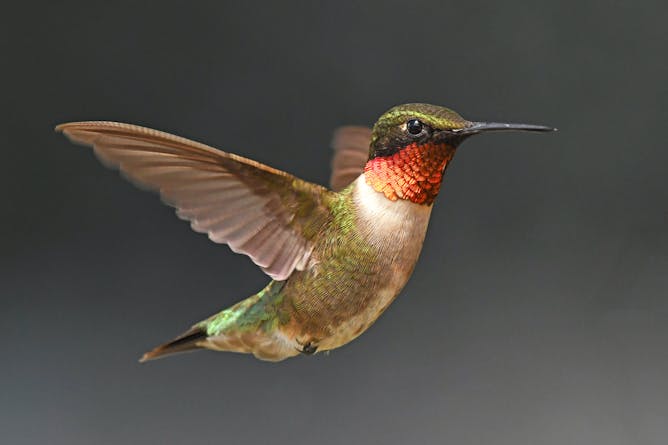
Hummingbirds are the only birds that can fly sideways and backwards, thanks to an evolutionary feature of their musculoskeletal structure.
(Shutterstock)
Ilias Berberi, Carleton University
Studying bird evolution has led to engineering innovations, including drones that can fly sideways and backwards, and silent wind turbines.
|
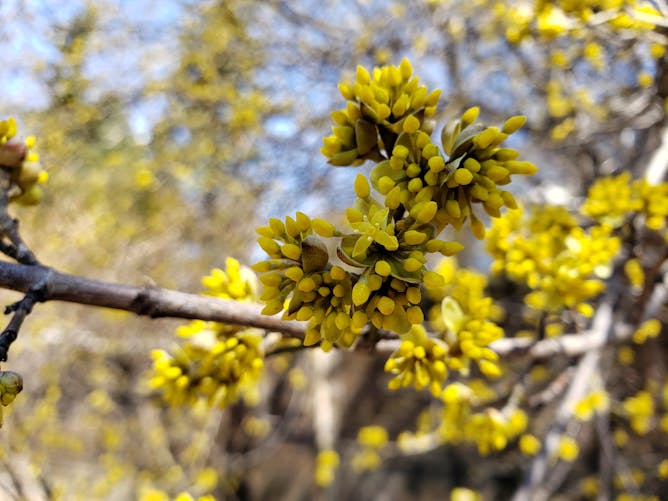
An early spring bloom in Toronto, taken on April 1, 2020.
(Alemu Gonsamo)
Alemu Gonsamo, McMaster University
Global warming has increased plant growth and helped offset increases in carbon dioxide emissions.
|
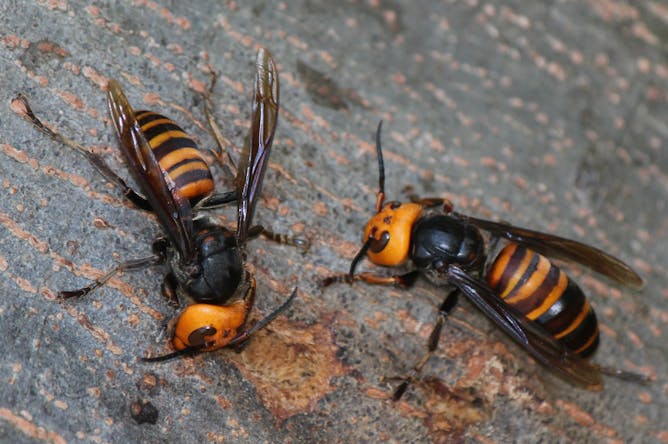
Asian giant hornets (Vespa mandarinia japonica) drinking sap from tree bark in Japan.
Alpsdake/Wikipedia
Akito Y Kawahara, University of Florida
Are 'murder hornets' from Asia invading North America? A Japanese entomologist who's been stung by one and lived to tell the tale explains what's true about these predatory insects.
|
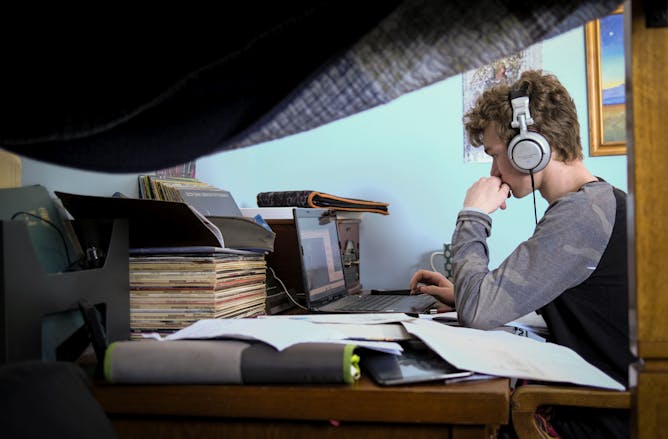
With Alberta schools closed, Caleb Reid, 17, and his siblings are home schooling in Cremona, Alta., shown here, March 23, 2020.
THE CANADIAN PRESS/Jeff McIntosh
Kaela Jubas, University of Calgary; Jackie Seidel, University of Calgary; Jaime L. Beck, University of Calgary; Kaori Wada, University of Calgary
In the face of mounting crises in Alberta, Premier Jason Kenney's decision to cut funding intended for educational assistants is bad policy.
|
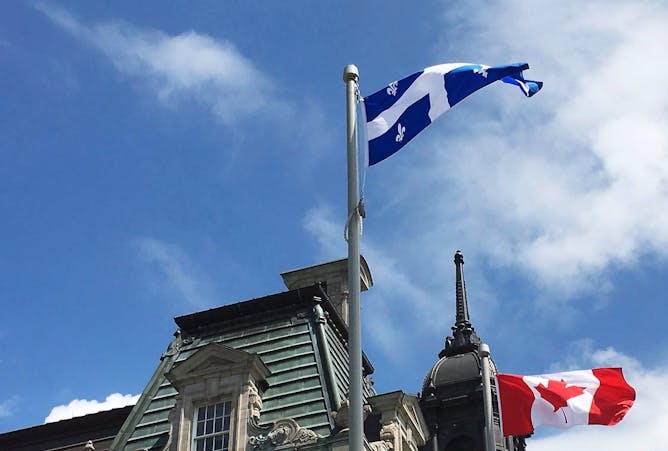
Flags fly outside of Montréal City Hall in June 2018. Health Canada has suspended official languages rules on bilingual labelling in an effort to speed up the importation of certain disinfectant and cleaning products during the coronavirus pandemic.
THE CANADIAN PRESS/Sidhartha Banerjee
François Larocque, L’Université d’Ottawa/University of Ottawa; Linda Cardinal, L’Université d’Ottawa/University of Ottawa
Seven million French-speaking Canadians shouldn't have to decipher English-only labels during the pandemic. Ottawa must take into account the fundamental rights and safety of all Canadians.
|

Because support from specialized professionals and technologies is often accessed through schools, families of children with disabilities may find childcare and education particularly challenging during COVID-19 school closures.
(Shutterstock)
Michelle Phoenix, McMaster University
COVID-19 has left children with disabilities and their families lacking services, at risk for physical and mental health issues, and fearful of discriminatory choices for treating critical illness.
|
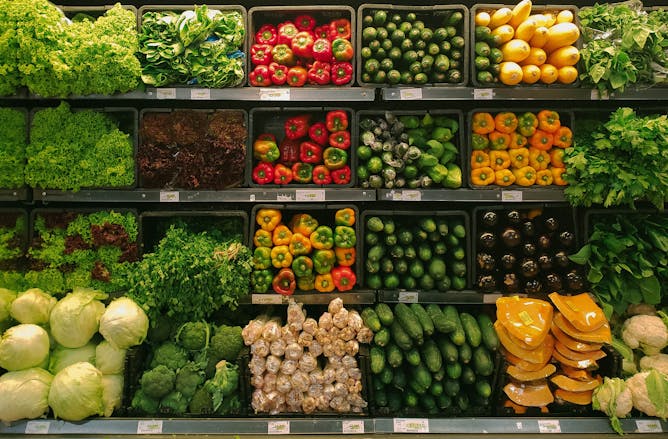
Food is a measure of how countries respond to crises from access to pricing to shortages.
(nrd/Unsplash)
Donica Belisle, University of Regina
Food is essential to survival. It is also essential to identity. During times of national crisis like the coronavirus pandemic and in the historical landscape, food issues become prominent.
|
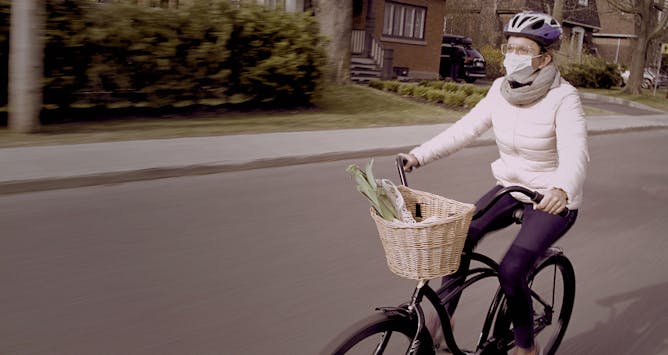
Une cycliste circule à Saint-Lambert, sur la Rive-Sud de Montréal. Pour que de comportements deviennent durables, il faut veiller à ce que le contexte de leur mise en œuvre soit maintenu après la crise et que les bénéfices qui y sont associés ne diminuent pas avec le temps.
Léo Trespeuch, Université du Québec à Trois-Rivières (UQTR); Aurélie Corne, Université de Perpignan; Béatrice PARGUEL, Université Paris Dauphine – PSL; Dominique Kreziak, Université Savoie Mont Blanc; Fabien Durif, Université du Québec à Montréal (UQAM); Florence de Ferran, Université de La Rochelle; Hélène Michel, Grenoble École de Management (GEM); Jean-Luc Giannelloni, Université Grenoble Alpes; Jean-Marc Fontan, Université du Québec à Montréal (UQAM); laurent.botti@univ-perp.fr, Université de Perpignan; Mathieu Lajante, Université Laval; Mireille Lalancette, Université du Québec à Trois-Rivières (UQTR); Myriam Ertz, Université du Québec à Chicoutimi
(UQAC); Nicolas Peypoch, Université de Perpignan; Robinot Élisabeth
La crise de la Covid-19 révèle qu’il est possible d’adopter à grande échelle des comportements plus responsables sur les plans environnementaux et sociaux. Mais ces comportements vont-ils perdurer?
|